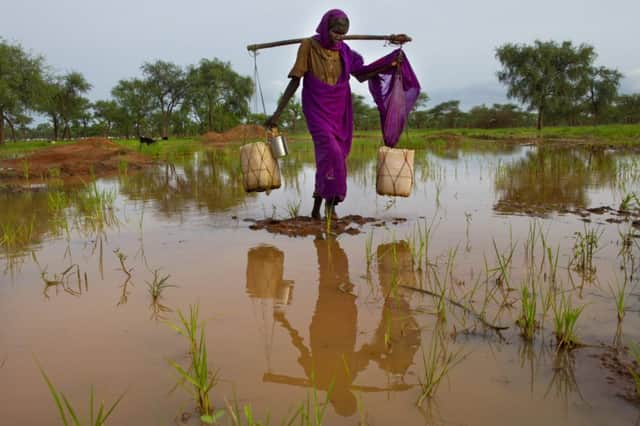Climate right for change of heart


If 2014 has been a year in which the eyes of the world have been on Scotland, next year is shaping up to be a year when we in Scotland must have our eyes on the rest of the world. Big decisions are set to be made by world leaders about how we tackle the two greatest issues of our time: poverty and climate change. It’s an opportunity we can’t afford to miss.
At the start of the 21st century, the nations of the world united behind a set of “Millennium Development Goals” to halve global poverty within 15 years. These included commitments to achieve gender equality, universal access to primary education, and halting the spread of HIV and AIDS. With the 2015 deadline approaching, progress towards these goals has been decidedly mixed – overall, global poverty has reduced, but inequalities have grown within, and between, regions, and a shocking 1.2 billion people still live in extreme poverty.
Advertisement
Hide AdAdvertisement
Hide AdMeanwhile, the progress that has been made is threatened by accelerating climate change. Resulting drought, floods and hurricanes destroy crops and homes, and make access to vital resources like water more difficult. And it’s increasingly clear that while the world’s most vulnerable people have done the least to cause global warming, they are suffering most from its devastating effects. Years of talks among world leaders have taken place within the United Nations. But much more political will is needed to reach a fair and effective deal to reduce emissions and provide funding to help poor countries adapt to a changing climate.
Over the next 15 months we have major opportunities to renew a global consensus to tackle poverty and protect people’s safety. At the UN general assembly in New York next September, a set of new sustainable development goals are expected to be agreed. Then a few weeks later, world leaders will meet again in Paris, where agreement about how to tackle climate change must be reached.
For the past two years, we have been on our own journey in Scotland, considering the future and the role we want to play in the world. The vibrance and level of engagement in that debate should be an example and encouragement to campaigners for social change all round the world. And as we look to the big decisions to be made in 2015, we must keep that vibrance and engagement going. Decisions about tackling poverty and climate change are too important to simply be left to world leaders – we all have a duty as global citizens to demand the changes we need for the world we want, and hold those leaders accountable for changing it.
At the end of September, a conference was held at the United Nations to prepare the ground for next year’s summits. Speaking at the conference, Pope Francis’ representative, Cardinal Parolin, called for urgent action: “the entire international community is part of one interdependent human family. The decisions and behaviours of one of the members of this family have profound consequences for the others; there are no political frontiers, barriers or walls behind which we can hide to protect one member from another against the effects of global warming. There is no room for the globalisation of indifference, the economy of exclusion or the throwaway culture so often denounced by Pope Francis.”
We each have a responsibility to help build a fairer and more just society. Our political leaders must go further and faster to build economies that put people and the planet at their heart. In the coming year, SCIAF and our supporters will be working with the Stop Climate Chaos Scotland coalition, Caritas Internationalis, and other global networks, to ensure our most vulnerable brothers and sisters are central in these important global debates.
At the same time, we all need to consider the impact our own lifestyle choices are having on the poorest around the world. It’s important for us all to look closer at our own behaviours and, as the saying goes, live more simply so that others can simply live.
So 2015 is an opportunity for the international community to choose a direction that puts people and the planet first, and for all of us to consider what it really means to be part of one human family.
• Alistair Dutton, is the Director of the Scottish Catholic International Aid Fund, part of the global Caritas family of aid and development agencies